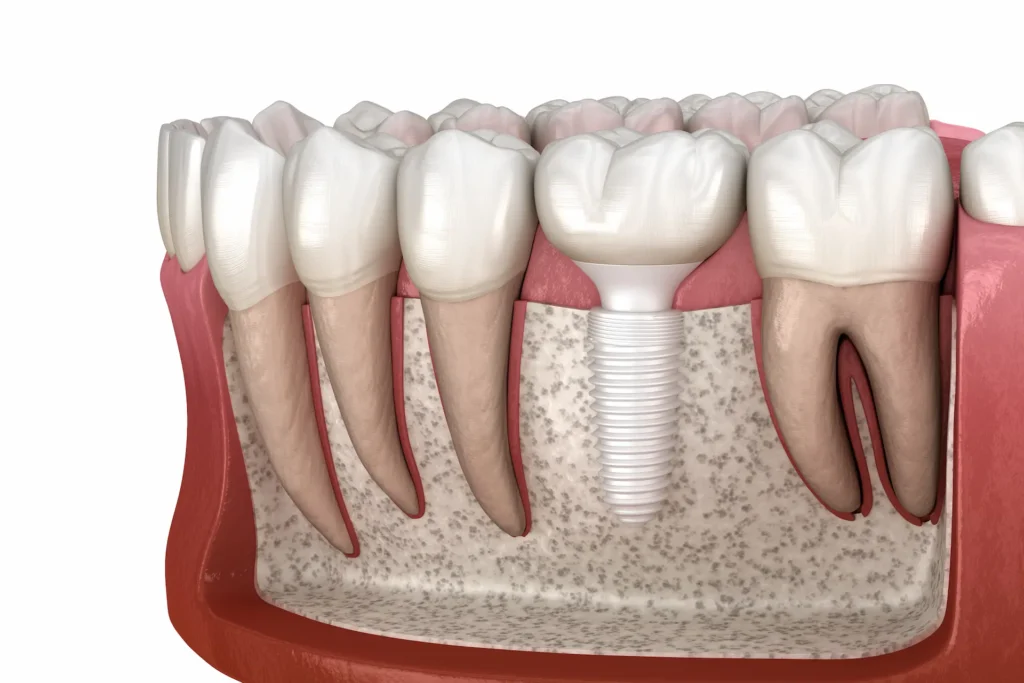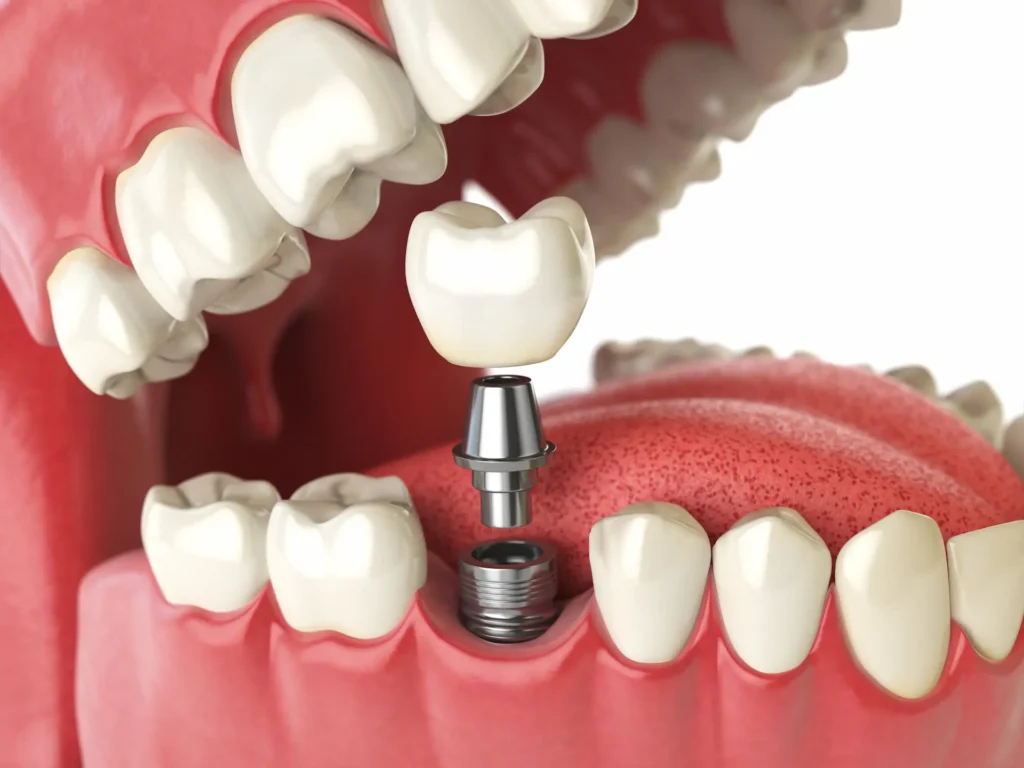The importance of a beautiful smile cannot be underestimated. It not only enhances the appearance of your face but also serves as a reflection of your overall dental health. At Hanna Dental Implant Center, we understand the profound impact that perfectly aligned, bright, pearly white teeth can have on your confidence.
Devoting time to the regular care of your teeth and gums can help to ensure that your teeth remain healthy. But while you can protect your overall health and the appearance of your smile by keeping your teeth and gums clean and healthy, oral and dental disorders can still arise, and most dental issues can be remedied.
One such dental issue is the loss of a tooth or teeth due to damage or decay; in these circumstances, dental implants are offered to restore lost teeth.
Dental implants have swiftly become one of the most common tooth repair techniques, with various advantages, including:
- Improving speech
- Allowing you to eat a variety of meals
- Functioning and looking like natural teeth
- No sliding or adhesives are required
- Long-lasting if well-maintained
With so many advantages, implants are unquestionably ideal and recommended by oral surgeons or dentists for one or more missing teeth.
Most dental implants are made of ceramic or titanium, sometimes a combination of both. Although both implants serve the same purpose, there are differences in cost, healing time, and longevity. Ceramic and titanium implants, in general, are designed to survive for decades with no difficulties.
If you’re thinking about getting a dental implant but need help determining which material is best for you, we’ll walk you through your options to help you make an informed decision.
What Are Ceramic Implants?

Ceramic implants are dental implants made from a porcelain-like material called ceramic. These implants are used to replace missing teeth, just like traditional titanium implants. The key difference is in the material used.
Often chosen for their natural appearance, ceramic implants closely resemble the color and translucency of natural teeth. They are particularly popular for front teeth, where aesthetics are a top priority.
Ceramic implants are also known for their biocompatibility, which means they are generally well-tolerated by the body. However, they may have slightly different strengths when compared to titanium implants. Here are some advantages of ceramic implants:
Pros of Ceramic Implants
- Looks and feels natural
- Blends in well with your other teeth
- Ceramic is usually well-tolerated by your gums and body
- Limited chances of issues with the new teeth
- Your gums can attach better to ceramic, making it more like a real tooth
Cons of Ceramic Implants
- Healing of the bone takes longer time to heal
- Ceramic isn’t as tough as titanium, so there’s a slight risk of it breaking or chipping.
- Has a higher cost
- Limited research on its longevity
What Are Titanium Implants?

As their name suggests, titanium implants are dental implants made from a strong, biocompatible metal called titanium. These implants are used to replace missing teeth in a way that mimics the function and appearance of natural teeth.
Titanium implants have a proven track record for durability and longevity, making them a widely accepted choice in dentistry. Placing titanium implants involves surgically inserting the titanium post into the jawbone. Over time, the bone fuses with the implant through a process called osseointegration, creating a stable foundation for attaching a dental crown or prosthetic tooth.
Known for their strength and resistance to corrosion, titanium implants can withstand the forces of biting and chewing. While they may not match the natural appearance of teeth as closely as ceramic implants, they are a reliable option for restoring dental functionality and maintaining oral health. Here are some of the advantages of titanium implants:
Advantages of Titanium Implants
- Titanium has a long history of being strong and durable
- Has a high success rate of 97%
- These implants can last more than 20 years if well-maintained
- Widely available and used by experienced dentists
- Titanium implants have biocompatibility with bone and gum tissues
- Generally cost less than ceramic implants
Cons of Titanium Implants
- Not as natural-looking as ceramic implants
- They may not blend as seamlessly with your other teeth
- In rare cases, some people might have allergies to titanium
What Are The Factors to Consider When Choosing Between Ceramic And Titanium Implants?
When choosing between ceramic and titanium implants, you will need to consider several important factors. Let’s discuss some of the factors below:
Go to the dentist to check your dental health.
The condition of your teeth and gums will play a crucial role in your decision. If you have healthy gums and strong teeth, you may have more options to choose your choice of implant materials.
What are your aesthetic preferences?
Consider how important the implant’s appearance and feel is to you. Ceramic implants are known for their natural look, while titanium implants may be more visible, especially in the front of the mouth.
What is your medical history?
Take into account any allergies or medical conditions you have. In rare cases, some people may be allergic to titanium, making ceramic safer and the only choice for them.
What is your dentist’s advice and recommendation?
Your dentist is the expert and can assess your oral health to provide guidance on the most suitable implant type for your specific situation.
Can you afford it, or does your dental insurance cover an implant procedure?
Dental work can vary in cost. Ceramic implants are more expensive than titanium implants, so your budget and insurance coverage may influence your decision.
What are your long-term expectations?
Think about your long-term goals. Are you looking for a long-lasting solution, or is a temporary fix acceptable? Your choice should align with your future dental needs and expectations.
Where in the mouth do you want the implant placed?
Consider where the implant will be placed. Ceramic implants are often chosen for front teeth due to their natural appearance, while titanium implants may be preferred for molars due to their strength.
Ceramic Implants vs Titanium: Making an Informed Decision
Both ceramic and titanium implant materials are highly successful, biocompatible, and FDA-approved. They are both extremely helpful to those with missing teeth looking to have functional and beautiful teeth.
Choosing the best implant material will only be determined by your needs and personal preferences. Ceramic implants blend flawlessly next to natural teeth when replacing a single tooth, whereas titanium implants are often preferred when all natural teeth are lost.
While titanium has been utilized in implant dentistry for over a half-century, ceramic is swiftly catching on. Ceramic implants are hypoallergenic, corrosion-resistant, and consistent with holistic dentistry. And they appear natural.
Remember, there is no one-size-fits-all, and the choice should be based on your needs and priorities. What matters most to you? Is it the appearance of your new tooth, its strength, or the cost? Make your decision based on what aligns with your personal priorities and circumstances, as well as the guidance of your dentist.
Book an Appointment with Hanna Dental Today for Your Preferred Dental Implant
Choosing between ceramic and titanium implants can be hard, especially if you want to do it alone. When you choose Hanna Dental for your dental implants in Houston, TX, we give you a patient form where you input your medical history. This helps us to assess your oral health and provide a tailored and personalized plan for your dental implant procedure.
Our holistic approach to dentistry offers a range of benefits that ensure a positive experience and exceptional results. To avoid the complications of infection after a dental implant procedure, we give our patients specific and personalized instructions on maintaining excellent oral hygiene.
When you choose Hanna Dental, you choose a team dedicated to oral health, comfort, and satisfaction. Contact us today to schedule a free consultation and take the first step towards having a confident smile.
Frequently Asked Questions
Do ceramic implants cost more than titanium?
Yes, ceramic implants tend to be more expensive than titanium implants. The higher cost is often due to the materials used and the specialized techniques required for ceramic implant placement.
What is the disadvantage of ceramic for implants?
The main disadvantage of ceramic implants is their strength. They are not as strong as titanium implants, making them more susceptible to chipping or breaking, particularly in areas of the mouth that undergo a lot of biting and chewing.
Why are ceramic implants better?
Some consider Ceramic implants better because they can offer a more natural-looking result. They closely resemble natural teeth in terms of color and translucency, making them an excellent choice for front teeth where aesthetics are crucial. Additionally, some individuals may prefer ceramic due to its biocompatibility and potential for gum integration.
How does a ceramic implant compare to a titanium implant?
Ceramic implants and titanium implants have their own advantages and disadvantages. Ceramic implants are known for their aesthetic appeal and biocompatibility but may have concerns regarding strength. On the other hand, titanium implants are strong, durable, and widely used but may not blend in with natural teeth. The choice between them depends on individual needs, priorities, and the guidance of a dentist.



